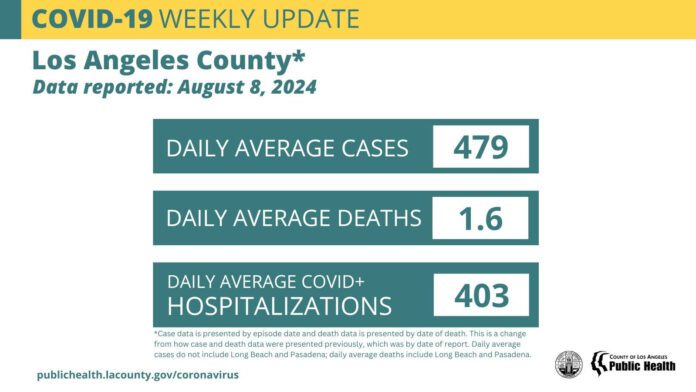Reported cases are up in Los Angeles County
In case you didn’t know, COVID-19 cases are on the rise this summer. California is experiencing its worst wave of infections since 2022. With rising cases in Los Angeles County, the Department of Public Health is warning, “Given the increased transmission of new strains of COVID-19, residents should continue taking common-sense precautions to avoid transmitting or becoming ill.”
The Malibu Times spoke with Malibu Urgent Care (MUC) to confirm a spike in cases locally.
“Over the last month we’ve seen more COVID infections in patients, for sure,” said Hydeen Mofford, a medical assistant and administrator at MUC. Most of the patients seeking medical help at the urgent care facility were reportedas moderately sick, but Mofford also reported “symptoms seem to be lingering a bit longer.”
The most common symptoms in this summer wave are cough, body aches, fever, congestion, and headaches. Many patients seeking care are prescribed the drug Paxlovid.
Doctors are saying it’s important to take precautions, especially for those over 65 or for those with underlying health conditions who are at higher risk of severe illness. Precautions include being up to date on vaccinations and boosters, frequent hand washing, and even the use of masks when in crowded indoor spaces.
Dr. Lauren Pike of Malibu Urgent Care reminds there are updated guidelines from the CDC (Centers for Disease Control) that the community should be aware of.
“When you’re sick, especially with COVID, stay home and away from others if you have any respiratory virus symptoms,” she said. “You can resume your normal activities once your symptoms are improving and you’ve been fever-free without any aid of fever-reducing medications for at least 24 hours. For the five days after you resume your normal activities people should be wearing a well-fitting mask and maintaining distance from others for another five days.”
Pike said it’s best to gather for outdoor activities or in other well-ventilated areas. She also suggested frequent hand washing and, if possible, to avoid frequently touched surfaces.
“Testing is also good before getting together with others,” Pike advised, even if you’re symptom free. “I think especially when we’re having this uptick in cases, especially if you’re getting together with people that are immunocompromised, it’s just good to do a test before you meet with other people.
“While you’re sick, stay home. Once you start improving, wait 24 hours before you go out into society and resume your normal activities. If you’re feeling better for 24 hours, and you want to resume your normal activities that’s completely acceptable, but you should be wearing a well-fitted mask for an additional five days. It’s important that we still follow the guidelines that the CDC proposed.”
Pike also remined those who are sick, should keep well hydrated.
MUC is offering rapid COVID tests that give results in just 15 minutes, but the tests are different from home testing.
“The gold standard of COVID-19 tests are the (NAAT) nucleic acid amplification tests and (PCR) polymerase chain reaction tests,usually done at a health care facility” Pike said. “Antigen tests are a good alternative to do at home. They’re pretty accurate [and] reliable. They are way more accurate when you’re symptomatic than if you’reasymptomatic. To really be confident that you don’t have COVID, they do recommend two negative antigen tests if you’re symptomatic 48 hours apart to feel comfortable that it’s not COVID.”
Dr. Patsy McDermott from UCLA Malibu Urgent Care also confirmed a spike in COVID cases this summer.
“It started going up in June. We had gone a month, maybe six weeks with almost no cases and now we see a handful every day,” she said, adding roughly one-quarter of her patients have been diagnosed. “Mostly what we see are people who recognized their symptoms and tested at home.”
She makes many video visits with infected people who self-isolate. McDermott noted that most of the patients she sees have already had COVID once, some three or four times. Though, “There is a subset of people who are first-timers. We call them ‘NOVIDS,’” she said.
McDermott said most of the COVID cases now are less severe than years earlier, “Which is a blessing … Most of our patients have been vaccinated. The least vaccinated are very young children.”
The doctor advises wearing a mask. She had stopped masking in May, but has started wearing one during this new wave of cases.
“It’s out there. People need to know there is a lot of asymptomatic spread,” said McDermott, who also noted a high number of cases of influenza B, historically spread after summer. She encourages people to get an updated COVID and flu shot this fall.

